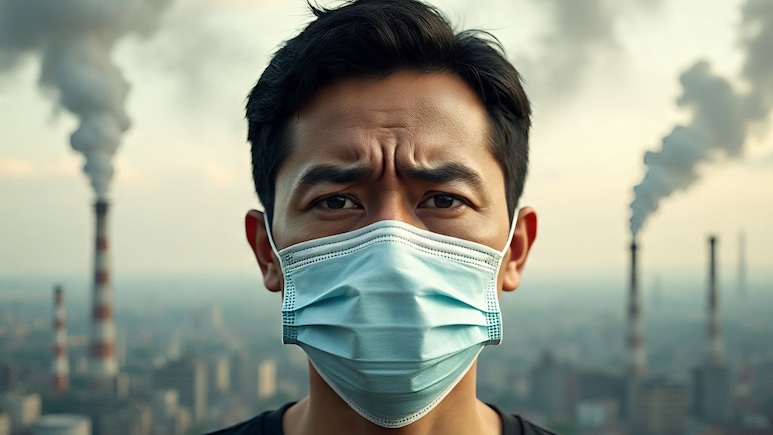
A significant spike in particulate matter (PM) levels in the air has been observed post-diwali in Delhi and nearby regions. On Wednesday morning, Delhi's air quality index (AQI) was recorded at 345 at 5:30 AM, which falls under the 'very poor' category. According to IQAir, New Delhi's Air Quality Index (AQI) soared to 442 right after Diwali. Many monitoring stations recorded PM2.5 levels 59 times more than the World Health Organization (WHO) recommended annual guideline. The impact of this heightened pollution on health is substantial. Poor air quality is linked to a range of health issues, including respiratory problems, cardiovascular diseases, and aggravated asthma.
"As Delhi's AQI rises again and falls under 'very poor' level, there could be significant rise in respiratory conditions, especially after Diwali. The dense smog, which contains fine particulates or dust particles (PM2.5 and PM10), irritates the airways and decreases lung function, which can lead to asthma flare ups, bronchitis, allergic rhinitis, throat infections and exacerbation of symptoms in those who have existing lung diseases," said Dr. Shivanshu Raj Goyal, Associate Director & Unit Head - Pulmonology, Respiratory & Sleep Medicine at Max Super Speciality Hospital, Dwarka.
Who is at a higher risk?
While poor air quality affects everyone, certain groups are more vulnerable to severe symptoms and complications. These include:
- Children
- Older adults
- People with pre-existing conditions, such as asthma, chronic obstructive pulmonary disease (COPD), or heart problems
- Pregnant women
- Individuals who spend prolonged periods outdoors
Also those who have pre-existing allergies, long Covid or even family history of allergies are prone to get worse symptoms.
When should you see a doctor?
According to Dr. Goyal, one should consult a doctor if they experience any of the following:
- Persistent coughing or wheezing
- Shortness of breath at rest with chest tightness or pain
- Difficulty breathing that interferes with daily activities
- Any signs of low oxygen, such as blue lips or fingertips
- In case you develop fever with yellow sputum, this could point towards pneumonia
For persistent issues, it is best to consult a pulmonologist (a lung specialist).
How to stay safe: Follow these preventive measures
- Monitor the Air Quality Index (AQI): Check the daily AQI and avoid outdoor activities on days when it is high and typically early mornings and evenings.
- Wear a high-quality mask outdoors: An N95 or higher-grade mask can filter out fine particulate matter (PM2.5).
- Stay indoors: Minimize outdoor exposure as much as possible, especially for at-risk individuals.
- Improve indoor air quality: Use air purifying plants, air purifiers with a HEPA filter to clean the air inside your home and office and avoid indoor activities that create smoke or fumes, such as burning incense or deep-frying food.
- Stay hydrated: Drink plenty of water throughout the day.
- Eat lung-friendly foods: A diet rich in antioxidants, vitamins, and minerals helps boost immunity against the effects of pollution.
- Practice breathing exercises: Techniques like pranayama and diaphragmatic breathing can help strengthen the respiratory system.
- Take your prescribed medication: If you have a pre-existing respiratory condition, continue to take your medications and keep rescue inhalers handy.
The expert also shared a few home remedies, these include:
- Gargle with lukewarm salt water to soothe a sore throat and remove irritants
- Inhale steam
- Use saline nasal sprays to reduce nasal itching and irritation caused by pollutants.
- Increase your overall fluid intake. Besides water, drinking warm fluids like herbal teas or soups can help soothe a sore throat and keep you hydrated.
- Use a humidifier.
Follow these preventive measures to stay safe. If you experience any health symptoms, consult a healthcare professional promptly.
(Dr. Shivanshu Raj Goyal, Associate Director & Unit Head - Pulmonology, Respiratory & Sleep Medicine at Max Super Speciality Hospital, Dwarka)
Disclaimer: This content including advice provides generic information only. It is in no way a substitute for a qualified medical opinion. Always consult a specialist or your own doctor for more information. NDTV does not claim responsibility for this information.
Track Latest News Live on NDTV.com and get news updates from India and around the world

